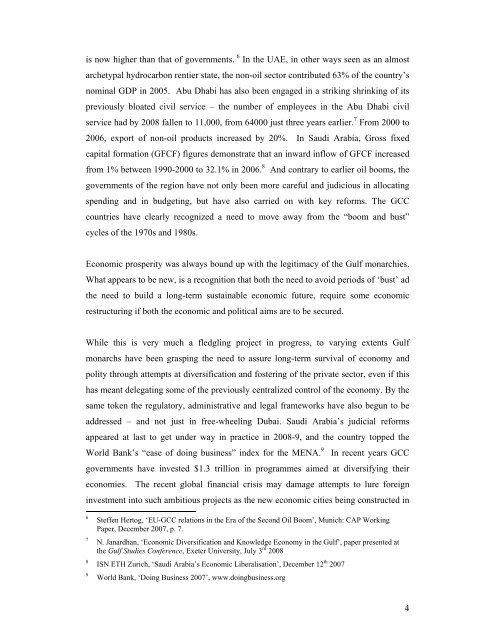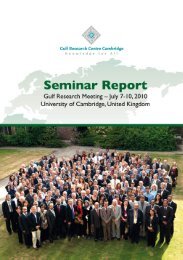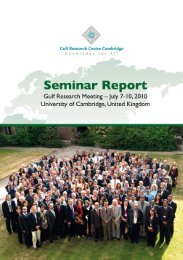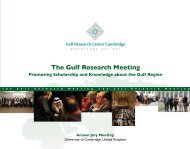Gulf Research Meeting 2010 - Gulf Africa Investment Conference
Gulf Research Meeting 2010 - Gulf Africa Investment Conference
Gulf Research Meeting 2010 - Gulf Africa Investment Conference
You also want an ePaper? Increase the reach of your titles
YUMPU automatically turns print PDFs into web optimized ePapers that Google loves.
is now higher than that of governments. 6 In the UAE, in other ways seen as an almost<br />
archetypal hydrocarbon rentier state, the non-oil sector contributed 63% of the country’s<br />
nominal GDP in 2005. Abu Dhabi has also been engaged in a striking shrinking of its<br />
previously bloated civil service – the number of employees in the Abu Dhabi civil<br />
service had by 2008 fallen to 11,000, from 64000 just three years earlier. 7 From 2000 to<br />
2006, export of non-oil products increased by 20%. In Saudi Arabia, Gross fixed<br />
capital formation (GFCF) figures demonstrate that an inward inflow of GFCF increased<br />
from 1% between 1990-2000 to 32.1% in 2006. 8 And contrary to earlier oil booms, the<br />
governments of the region have not only been more careful and judicious in allocating<br />
spending and in budgeting, but have also carried on with key reforms. The GCC<br />
countries have clearly recognized a need to move away from the “boom and bust”<br />
cycles of the 1970s and 1980s.<br />
Economic prosperity was always bound up with the legitimacy of the <strong>Gulf</strong> monarchies.<br />
What appears to be new, is a recognition that both the need to avoid periods of ‘bust’ ad<br />
the need to build a long-term sustainable economic future, require some economic<br />
restructuring if both the economic and political aims are to be secured.<br />
While this is very much a fledgling project in progress, to varying extents <strong>Gulf</strong><br />
monarchs have been grasping the need to assure long-term survival of economy and<br />
polity through attempts at diversification and fostering of the private sector, even if this<br />
has meant delegating some of the previously centralized control of the economy. By the<br />
same token the regulatory, administrative and legal frameworks have also begun to be<br />
addressed – and not just in free-wheeling Dubai. Saudi Arabia’s judicial reforms<br />
appeared at last to get under way in practice in 2008-9, and the country topped the<br />
World Bank’s “ease of doing business” index for the MENA. 9 In recent years GCC<br />
governments have invested $1.3 trillion in programmes aimed at diversifying their<br />
economies. The recent global financial crisis may damage attempts to lure foreign<br />
investment into such ambitious projects as the new economic cities being constructed in<br />
6<br />
Steffen Hertog, ‘EU-GCC relations in the Era of the Second Oil Boom’, Munich: CAP Working<br />
Paper, December 2007, p. 7.<br />
7 N. Janardhan, ‘Economic Diversification and Knowledge Economy in the <strong>Gulf</strong>’, paper presented at<br />
the <strong>Gulf</strong> Studies <strong>Conference</strong>, Exeter University, July 3 rd 2008<br />
8 ISN ETH Zurich, ‘Saudi Arabia’s Economic Liberalisation’, December 12 th 2007<br />
9 World Bank, ‘Doing Business 2007’, www.doingbusiness.org<br />
4





